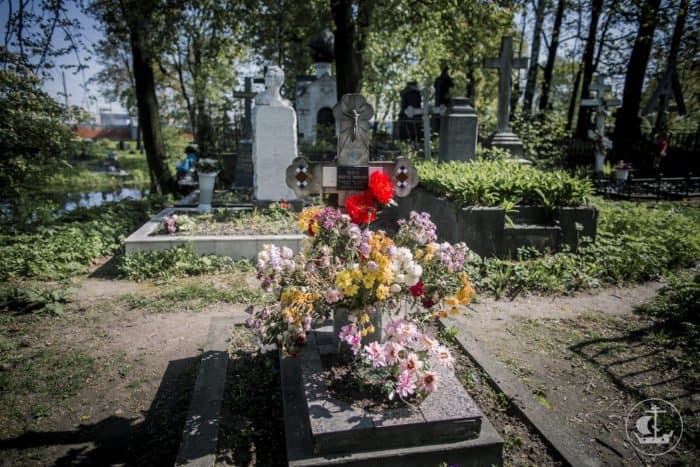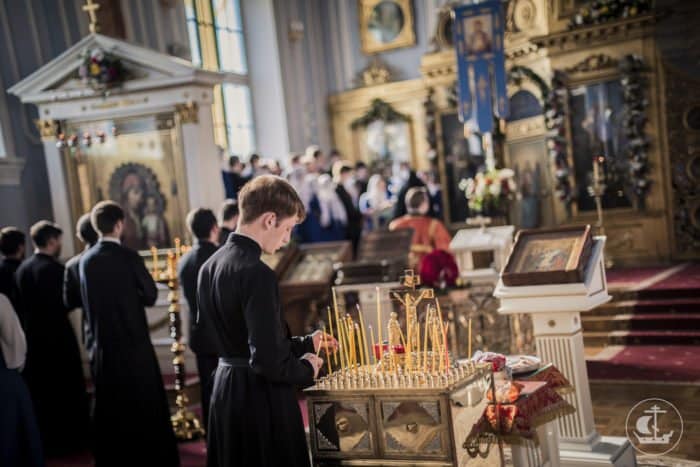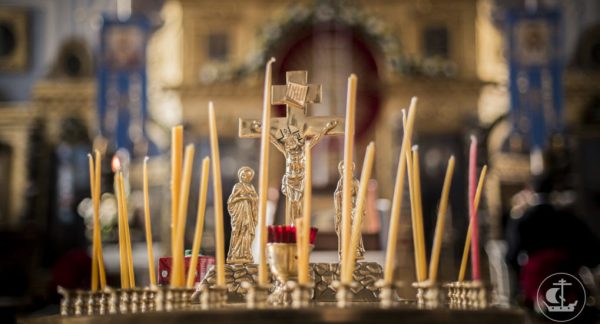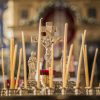
Fr. Stefan Domuschi
Is it possible to talk with deceased relatives? How to commemorate the departed at home? Is there any hope of salvation for suicides and atheists? Foma journal asked Father Stefan Domuschi, PhD in Theology and Philosophical Sciences, to answer these and other questions.
Question 1: Can you speak with the departed, ask them for help and their prayers?
Nearly all questions concerning the afterlife cannot have a single answer. It is no coincidence that the Venerable Anastasius, Abbot of Sinai, says that a person who is trying to find out secrets of the afterlife with his feeble mind will fall into the most terrible misconceptions, because it is not useful for him. According to the venerable saint, God has revealed to us what is useful to us to the extent that it is useful.
As for prayer, there is a tradition to pray to the departed Christians from ancient times, or rather, to ask them to pray to God for us. In ancient times, the Church very clearly distinguished between a departed Christian and a departed non-Christian. A man who died, being connected with Christ, died as a member of the Church, although he is physically separated from his brothers and sisters, he remains deeply connected with them through Christ! When we say that Christ “trampled down death by death” on Pascha, it means that He conquered our death, including the physical one as well, but first of all He conquered death as the separation of one’s soul with God. Therefore, he who dies in Christ, although physically dead, no longer dies spiritually, that is, he is not excommunicated from God and remains alive in Christ. When the Church buried her dead, she felt that these people remained connected with the rest of the living members of the community.
In this understanding, people of course could ask the departed to pray. We are used to ask only saints for prayers, but in ancient times people called all members of the Christian community saints, because they are a chosen kind, a holy kind: Apostle Paul writes, for example, to the ‘saints who are in Corinth’, thus addressing all Christians of Corinth. Therefore, people could ask all deceased members of the community for prayers.
In this sense, communication with the departed is, of course, possible.
Often talking with the departed is some kind of psycho-training for people, a certain psychological practice that helps a person to calm down. The Church supports rather praying for the departed than a “conversation” with him. Perhaps the only context in which such a conversation is possible is the context of prayer. For this, a person really should live a spiritual life: he must be a faithful member of the Church.
Question 2: Is hanging a photograph of a deceased loved one on the wall an Orthodox tradition?
Certainly, one should not hang a portrait in a red corner, next to the icons. But we easily can hang portraits of our relatives elsewhere in the house. There should not be any superstitious fears: the deceased cannot do anything to us, they cannot bring luck or misfortune to a person. The obvious benefit of such a portrait is a prayerful memory: we will remember our loved one, when we see a photograph of him, and we can pray for him. It often happens that when a person dies, he is lost from sight, and soon fades away from our memory.

Photo: spbda/www.flickr.com
Question 3: Some people say, “The deceased has become my guardian angel” or “He helps me.” Is it right?
There is no sign of worship of ancestors who protect or preserve people in Christianity. This is characteristic of many pagan beliefs that can be also found today. In Christianity, there is respect for the ancestors, there is a prayer for them, but of course, there is no concept that they protect the living. If the deceased person was a pious Christian, a faithful member of the Church, he can help us with his prayers, as I said. His love does not leave his loved ones, although he has already left this world. But, of course, the deceased do not become guardian angels.
Question 4: Sometimes people believe that if an infant dies soon after birth, he may return to the family in the next child. Is it acceptable to think so?
The Church unequivocally does not accept any reincarnation. The deceased infant is with the Lord and, of course, can not return anywhere. So this is a mistake.

Photo: spbda/www.flickr.com
Question 5: Is there hope for salvation for suicides, people who died unbaptized, or for those who were ardent atheists during their lifetime?
There are people who claim here and now that some people are lost, that they will not be saved, and will be in hell. However, the Church never denied the possibility of prayer for all people who left this world. There is even Trinity Commemoration Saturday, on which, according to St. Basil the Great, you can even pray for “all those in hell.” On this day, as stated in the first song of the canon, we pray for all people. Indeed this is very important! This means that God is merciful, and the last judgment is in His hands, we have no right to anticipate it and say whether a certain person will be saved or will perish.
A certain “formula” was revealed to the Venerable Silouan of Athos: keep your mind in hell and do not despair. We can doubt our salvation, but we hope for it. Regarding the salvation of other people, Apostle Paul directly writes in the Epistle to the Corinthians: “Therefore judge nothing before the time, until the Lord come, who both will bring to light the hidden things of darkness, and will make manifest the counsels of the hearts.” (1 Cor 4: 5). We do not know the relationship between a particular person and God. How can we judge whether he is saved or not? In the end, many saints have confidence that people who could not hear the message of Christ during their lives or heard it in a distorted form, will be judged by the Lord in a different way, apart from those who heard the Gospel in full. So there is always hope! And hope, as Scripture says, makes not ashamed (Rom 5: 5).
Question 6: How to commemorate the departed outside the church: is it necessary to read the Psalter or can you pray with your own words?
Prayer is always very individual. Despite the fact that there is a general rule, a person by agreement with a priest or by his own understanding, if the priest is not nearby, by his own strength, in conscience, can read those prayers that he considers appropriate for himself.
There are prayers for the departed in all prayer books, they can be read both in a church and at home. And, of course, no one forbids praying with your own words. Traditionally, in the first 40 days after the departure of a person, people read the Psalter, and there are certain rules for reading the Psalms: one kathisma every day. However, at the same time, a person is not limited to these rules! He can easily read the Psalter at another time, and to the extent that he has the strength for.
Question 7: If a person has been suffering for years over the death of a loved one, how can he overcome grief and a sense of despair?
Sorrow and grief are natural, but St. John Chrysostom says that Christ, who wept next to the tomb of Lazarus, showed us the measure of our sorrow. That is, it should be just sadness. Sadness that a person lived near us, and now has died, but it should not be excessive grief, which, as many authors write, offends God.
There are three main topics in the burial service: the theme of obligatory prayer for the deceased, the theme of the memory of death (that is, you yourself must remember death) and the hope for resurrection. The Gospel reading at the funeral service and the apostolic reading speak precisely of the resurrection!
Therefore, if a person grieves immensely, he thus shows that he does not have hope, does not fully trust in God, does not believe in His support, does not believe in His comfort and, as a result, does not believe in the immortality of the soul and resurrection of the dead. If he does not believe in it, how can the Church help him? But if he believes in it, he should not grieve excessively, and here the Church gives him comfort. As Apostle Paul writes: “I would not have you to be ignorant, brethren, concerning them which are asleep, that ye sorrow not, even as others which have no hope. For if we believe that Jesus died and rose again, even so them also which sleep in Jesus will God bring with him. <…> For the Lord Himself shall descend from heaven with a shout, with the voice of the archangel, and with the trump of God: and the dead in Christ shall rise first; Then we which are alive and remain shall be caught up together with them in the clouds, to meet the Lord in the air: and so shall we ever be with the Lord. Wherefore comfort one another with these words.” (1 Thessalonians 4:13-18)
















